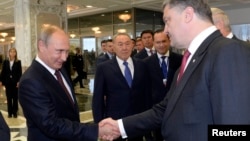Russian President Vladimir Putin and Ukrainian leader Petro Poroshenko will look for ways to settle a dispute over natural gas supplies and end months of conflict in east Ukraine at talks in Italy this week.
The meeting in Milan on Friday, is an encouraging sign for Moscow, Kyiv and Brussels, which fears Russia's decision to cut supplies to Ukraine because of unpaid bills could threaten disruptions in the gas flow to the rest of Europe this winter.
European leaders hope the presidents' third meeting since Poroshenko was elected in May can help the sides build on a much-violated cease-fire agreed by government forces and pro-Russian separatists in eastern Ukraine on September 5.
"I think there are some positive signs. It seems like we are entering a more promising and positive chapter of the whole puzzle about the crisis in and around Ukraine," said Vygaudas Usackas, the European Union's ambassador to Russia.
But he told Reuters the 28-nation bloc wanted "sustainable efforts, and concrete outcomes and tangible results."
Although Putin announced this week that Russian troops near the border with Ukraine would be pulled back, Western officials want to see clear evidence that Moscow is withdrawing troops and military equipment from east Ukraine.
Moscow denies arming the rebels or sending troops, despite what the West says is overwhelming evidence to the contrary.
The Kremlin said Putin and Poroshenko had discussed peace moves in a phone call on Tuesday.
Italian Prime Minister Matteo Renzi will host the meeting between Putin and Poroshenko during a summit of European and Asian leaders, Renzi's office said.
The meeting will also be attended by German Chancellor Angela Merkel, French President Francois Hollande, British Prime Minister David Cameron as well as Herman Van Rompuy, the chairman of European Union leaders, and EU Commission President Jose Manuel Barroso.
A Putin aide, Yuri Ushakov, did not rule out the possibility of a separate one-on-one meeting afterwards and said Putin would also meet Merkel separately.
Poroshenko said "the whole world has high expectations" of his talks with Putin.
Gas dispute
More than 3,600 people have been killed in the conflict in eastern Ukraine, and the EU and the United states have imposed sanctions on Russia over its annexation of the Crimea peninsula and the conflict in the eastern regions.
The conflict has complicated efforts to resolve the long-running dispute over gas supplies.
Ukraine faces possible energy shortages this winter if no deal is reached, which in turn risks causing disruptions to Europe's gas supplies as happened in 2006 and 2009. Europe receives a third of its gas needs from Russia, around half of which is pumped via Ukraine.
Russian natural gas producer Gazprom cut supplies to Ukraine in June after Kyiv failed to pay gas debts which Russia says have now reached more than $5 billion.
"I think that the meeting in Milan will bring a breakthrough in the gas sphere," said Mykhailo Pohrebinsky, a Kyiv-based political analyst. "Russia will eventually sell gas to Ukraine, after Ukraine pays a symbolic part of its debt, this will allow Ukraine not to freeze in winter."
Officials from Russia and the European Commission, which is mediating the talks, say a deal could be near. Poroshenko said on Saturday he hoped for "significant progress" on the issue during the talks in Milan.
Usackas, a former Lithuanian foreign minister, said there were still differences to be ironed out but the presidents' talks and a meeting on October 21 of the countries' gas company chiefs raised hopes of a deal. One key difference is over price.
Moscow's relations with the West are at their lowest ebb since the Cold War ended more than two decades ago. Deep divisions remained between Washington and Moscow after talks between U.S. Secretary of State John Kerry and Russian Foreign Minister Sergei Lavrov in Paris on Tuesday.





